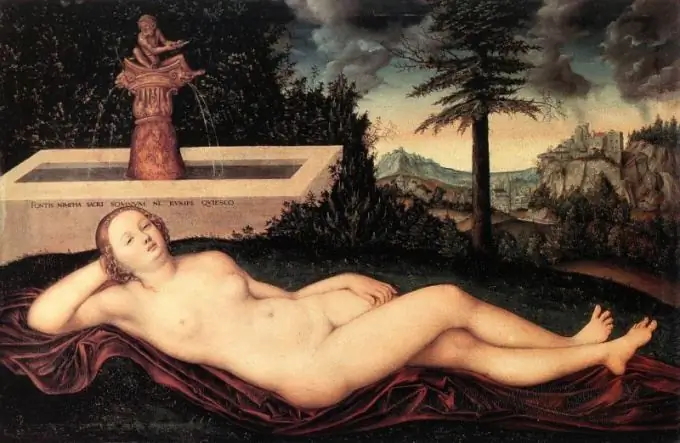A nymph is such an ancient Greek deity. But not one of the greatest gods living on Olympus, but a smaller deity, as it were, of a lower order, living in forests, valleys, seas - in the same place where man lives and is.

Where did the nymph come from
The word "nymph" comes from the ancient Greek language. The ancient Greeks were pagans, they believed in the existence of many gods and deities. So, according to their beliefs, each phenomenon or, as they would say now, an object of nature had its own soul or patroness. It was these mysterious ephemeral creatures that the ancient Greeks called nymphs.
Everything is beautiful in nature, therefore, nymphs, personifying the forces of nature, were depicted as naked or half-naked beauties, often dancing, whose hair was loose and beautifully fluttered or were decorated with wreaths woven of flowers.
What are they - nymphs?
The inhabitants of Ancient Greece, or Hellas, imagined these mythical creatures in the form of beautiful gentle girls. They believed that there are nymphs of trees - dryads; the nymphs of the valleys - sing; meadow nymphs - limnads; nymphs of mountains and grottoes - oreads; nymphs of springs, rivers and lakes - naiads (they are also called mermaids); and even oceanids - as you might guess, the nymphs of the oceans.
The Greeks believed that some nymphs are immortal, like the gods, while others die, just like people. So, for example, it was believed that the dryad lives as long as the tree itself, which she patronizes.
They also believed that the nymphs knew the future and they could predict it. There was such a widespread method of fortune-telling: tablets with various texts were thrown into a stormy stream (where, of course, nymphs live!); that tablet that will not sink and be washed ashore is the truth.
The ancient Greeks used to have such a peculiar, as we would say now, investigative experiment. If a person was suspected of having committed a crime, and it was not possible to prove it, he was thrown into the river. If the suspect swam out, no one had any doubts about his innocence - of course, these naiads, knowing that he was innocent, helped him!
They even offered sacrifices to the nymphs - wine and milk, goats and calves.
It was believed that the springs near which the nymphs live have healing properties. Therefore, the ancient Greek god of healing Asclepius appeared surrounded by these beautiful creatures.
Together with them appeared the god Bacchus, who was responsible for feasts, wine and other carnal pleasures; these nymphs were called bacchantes.
Although the nymphs lived lower than Olympus, inhabited by the gods, by order of the most important god Zeus, they appeared in his divine palace.
This image and concept - a nymph - has become firmly established in European and Russian culture. A charming girl can be called a nymph, a portrait of a beautiful woman can be painted in the form of a nymph …

